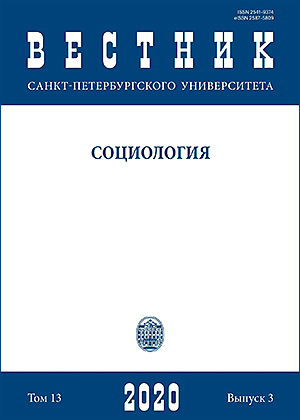Maksim Kovalevsky’s ideas on the education and upbringing of youth
DOI:
https://doi.org/10.21638/spbu12.2020.304Abstract
In the article, Maksim Kovalevsky’s work is considered as a prehistory of Russian youth sociology. His understanding of the essence of upbringing is analyzed (not grouping everyone under one pattern, but the development of individual characteristics; the relationship of socialization and individualization, a combination of duty to society and freedom of personal self-determination) and the main agents of upbringing (family and school). The sociologist’s emphasis
on the evolutionary nature of social development determined the impossibility of simultaneously creating a new system, a new religion, and morality. The family is the main center for the upbringing of youth. Its history is the history of intergenerational relations with the following perspective: the family as a “pacified environment”. It serves as the rationale for the transition from traditional education (submission and obedience of youth) to “leadership of the ascending generation”. Education is a holistic process (inseparable from accomplishment), the assimilation of the beginnings of a universal human culture. The sociologist’s guideline is access to education, removing social barriers to education. He determined the problems of equality (inequality) in regard to origins, the chances of youth, and the connection between education and self-education. The most important function of the university is education, the
upbringing nature of direct communication between teachers and students, its “reverse” effect on educators, the significance of interpersonal communication in the student community, and student self-government. The university is a hotbed of “guiding currents of social thought”. The article presents the importance of the educational value of sociology, synthesizing the principles of human society. The authors emphasize that taking into account the experience
of others in teaching and upbringing (reaching the level of world science and literature as well as the “rejection of blind imitation”) plays an important role. In conclusion, the prospects for further analysis of the problems of individual areas of youth education in the work of Kovalevsky are determined.
Keywords:
Maksim Kovalevsky, sociological heritage, sociology of youth, education, family, school, university, socialization
Downloads
References
References
Downloads
Published
How to Cite
Issue
Section
License
Articles of "Vestnik of Saint Petersburg University. Sociology" are open access distributed under the terms of the License Agreement with Saint Petersburg State University, which permits to the authors unrestricted distribution and self-archiving free of charge.




